Playback speed:
In the intricate world of search engine optimization (SEO) tools, finding the right fit can be akin to a treasure hunt. Rest assured, you’re not navigating these waters alone. While grappling with the challenges presented by Surfer SEO, I delved into extensive research and testing, unearthing a trove of replacements poised to elevate your content strategy without breaking the bank.
Are you ready to climb the ranks in search results with some of the best Surfer SEO alternatives? Let’s embark on this journey together.
Alternatives to Surfer SEO in 2024 [Key Takeaways]
- Surfer SEO alternatives offer a range of prices, features, and user-friendly options to fit different budgets and needs.
- Tools such as Frase, Content Harmony, SE Ranking, MarketMuse, WriterZen, and Semrush Writing Assistant provide unique benefits for content optimization and strategy.
- Some tools use artificial intelligence (AI) to help with content marketing, while others track search engine rankings or offer a detailed analysis of topics and keywords.
- Each alternative has pros and cons, compared to Surfer SEO, that should be weighed before deciding which one fits your strategy best.
- Opting for the right tool can streamline your workflow, improve your content’s SEO quality, and potentially boost your website’s search engine rankings.
What Is Surfer SEO?
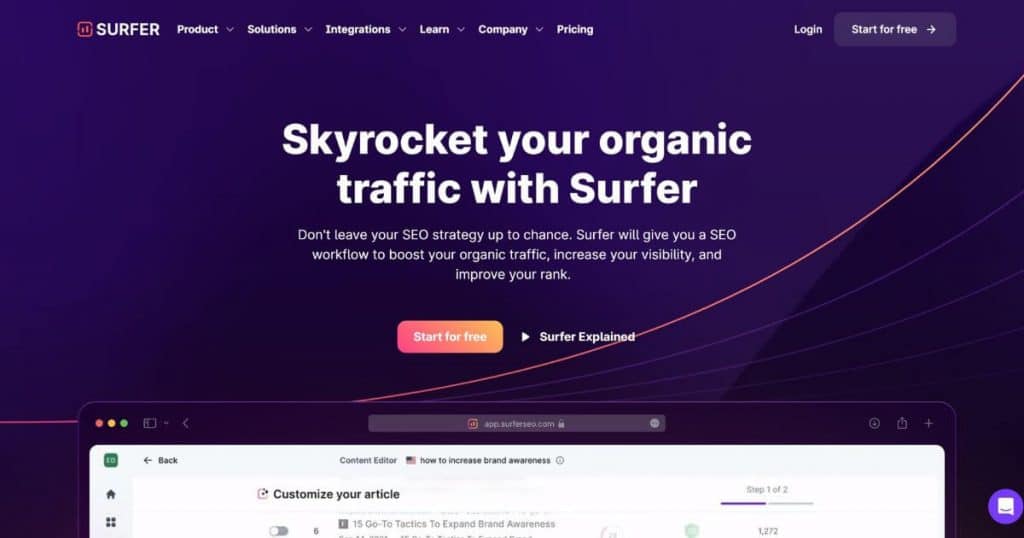
Surfer SEO is a keyword research tool that excels at analyzing keywords and utilizing AI-driven insights to fine-tune your web pages for search engine success. With Surfer SEO, it’s easy to uncover relevance and tap into untapped opportunities, boosting your organic traffic with precision.
Criteria for Choosing Surfer SEO Alternatives
When searching for Surfer SEO alternatives, it’s not just about changing what I have. It’s about finding a new and effective solution. I look for a mix of affordability, intuitive design, and killer features that take my SEO game from good to amazing.
Let’s get to the essential details that define whether an alternative is a good choice or not:
- Price: Affordability is key, and I look for tools that provide more value for my investment. Surfer SEO starts at $89 a month, but alternatives have their own pricing strategies, offering additional features or services as you climb the pricing tiers.
- User interface: Efficiency in the tool’s interface is crucial for streamlined workflows. Content Harmony and NeuronWriter stand out with their user-friendly designs, simplifying complex SEO tasks by offering visual content guidelines and intuitive workflows.
- Advanced features: Exploring alternatives involves seeking tools with advanced features. Turbocharged topic modeling and AI-driven content suggestions are game-changers, providing distinctive perspectives for search engine rankings.
“The use of content optimization tools has greatly benefited our company. The tools with the right SEO strategy have streamlined our content creation process by giving insights into search volumes, trending topics, and competitive analysis. These tools helped us identify and prioritize keywords, helping us improve our rankings and drive more traffic to our website organically.” — Marcus Clarke, Founder, Searchant
#1 Frase

If you’re on the hunt for a Surfer SEO substitute that hits the mark with its intuitive AI-driven content tools, Frase might just be your ticket to SEO success. It can revolutionize your keyword game.
Frase is a powerful tool that helps me boost my SEO and create better content. With Frase, I get more than just guidelines. It’s a comprehensive tool that aids in the content creation process. I receive detailed outlines for writing articles tailored to what people are searching for online, which helps me create content that resonates.
Frase digs into places like Reddit and Quora to find out what users want to be included in the posts I write. Plus, its text editor is super useful because it lets me drop important sections into my work as I go along—real-time SEO optimization at its best.
- Pros: Intuitive user interface, SEO guidance, AI-driven content generation, detailed content briefs, and affordable pricing.
- Cons: Limited integration with external analytics tools, steep learning curve, potential need for manual edits in AI-generated content, and overwhelming features.
#2 Content Harmony
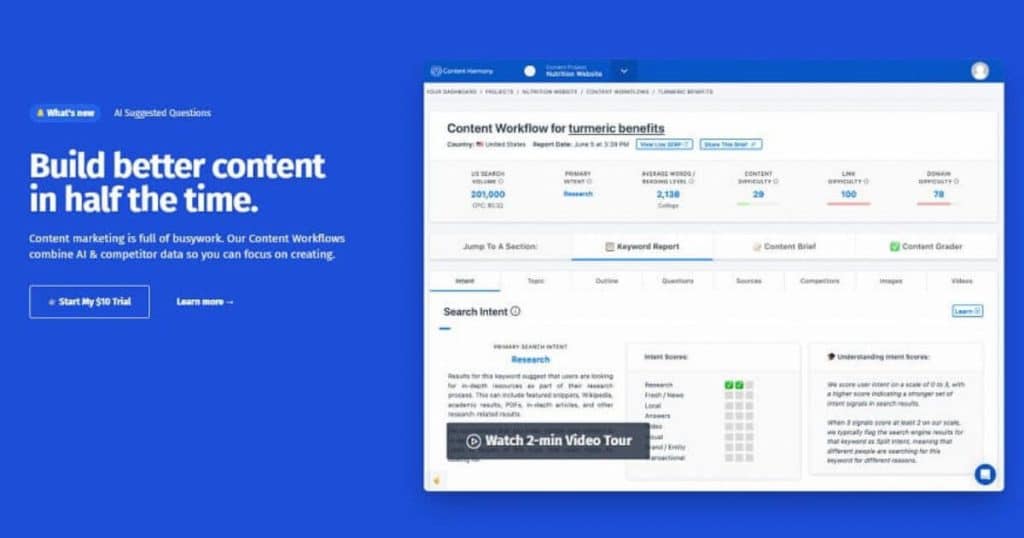
Content Harmony is an advanced SEO tool loaded with features that elevate your content to rank above the rest.
It dives deep into search intent classification and serves you up competitor content structures on a silver platter. You get to build data-driven content briefs that are nothing short of comprehensive.
With this powerhouse, I breeze through creating research briefs loaded with question data and keyword difficulty insights. We’re talking about detailed topic models and visual guidelines that make your content pop off the page.
Shareable URLs mean my team, clients, and freelancers all get what they need without breaking a sweat. Content Harmony truly packs a punch for our entire SEO strategy.
- Pros: Data-driven workflow, live data for content analysis, comprehensive topic modeling, visual and video content guidelines, enhanced research brief workflow.
- Cons: Steeper learning curve, pricing may be considered high for some, occasional data lags, overwhelming interface.
#3 SE Ranking
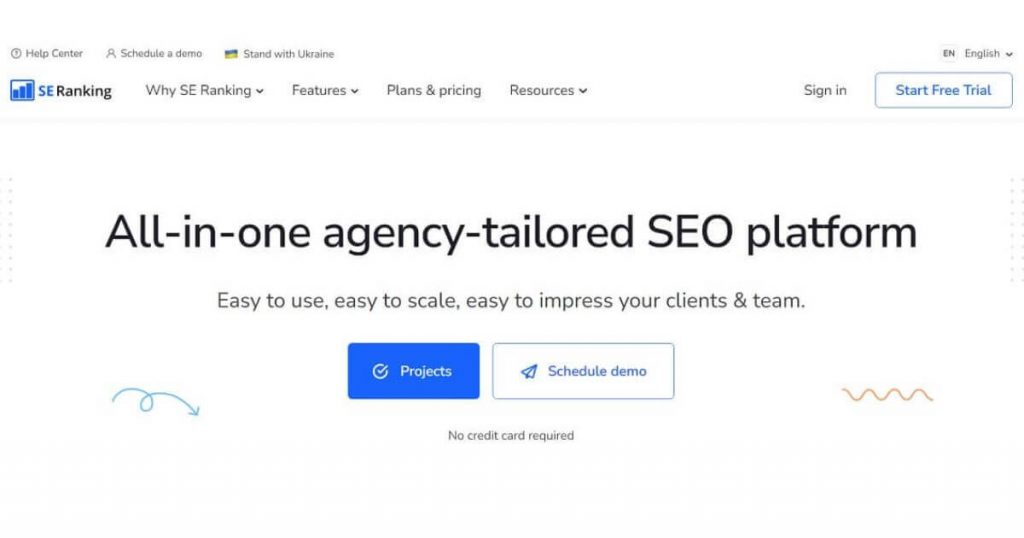
SE Ranking is a game-changer for budget-friendly SEO. Picture one tool handling everything—from keyword research to content analysis. SE Ranking even tracks your daily search engine rankings, offering a real-time SEO performance check.
What sets it apart? Affordability. Even though its free version comes with some limitations, SE Ranking is still among the best free alternatives to Surfer SEO. It provides comprehensive SEO tools, suggesting best practices to enhance existing content or create new, success-ready pieces. Suitable for beginners and pros alike, SE Ranking meets you at every step of your SEO journey.
- Pros: Cost-effective pricing, all-in-one platform, usability and functionality balance, comprehensive SEO tools.
- Cons: Limited data points, user interface learning curve, response times for customer support may vary, and SEO reports are not as detailed as competitors.
#4 Semrush Writing Assistant
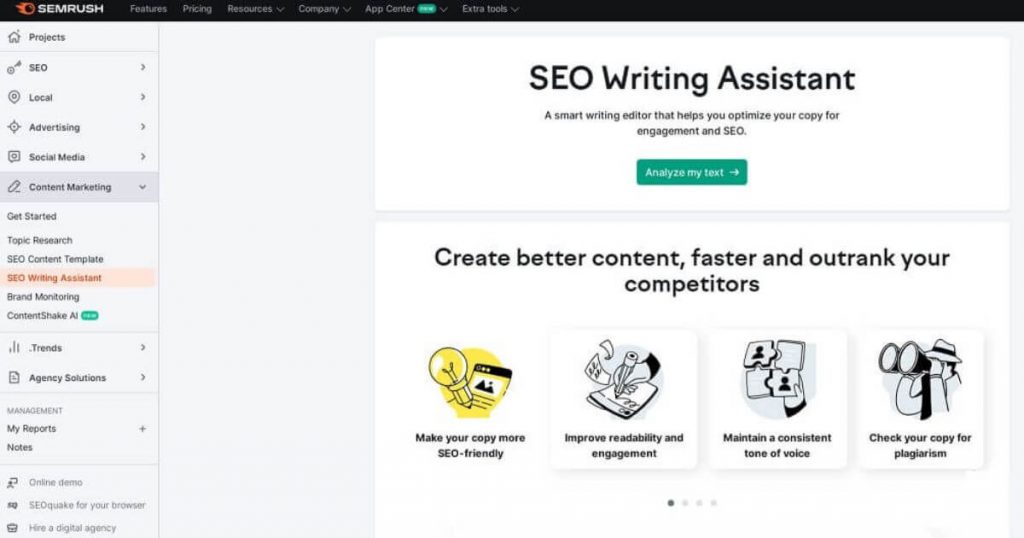
The Semrush Writing Assistant not only polishes your content for SEO success but also layers on a savvy marketer’s touch, ensuring your writing hits the spot every time.
The Semrush Writing Assistant makes my SEO tasks easier. It gives real-time advice on optimizing content, such as internal links or useful backlink suggestions. As I type, it checks for readability, tone of voice, originality, and even title performance against best practices, streamlining the content creation process.
It’s also great for keeping my writing on track with SEO goals without leaving the WordPress editor or Google Docs. This integration means less back-and-forth between tools; efficiency at its finest. Plus, it provides tips on how to improve based on what ranks well in similar articles, which is a shortcut to understanding what works in SEO today.
“I think that the Semrush writing tool is an underutilized aspect of the tool for many users. Whether that’s because they already use something like Surfer or they simply don’t know it’s there, I think that with proper context, it’s a useful tool to have. I really like how the graph shows your blend of readability versus optimization (what I like to view as human versus search engine content!) and that you can see it improve in real time as you work through the recommendations.” — James Taylor, SEO Strategist, Embryo Digital
- Pros: A wide array of content optimization tools, valuable suggestions for content and SEO enhancement, seamless integration with Google Docs.
- Cons: Limited AI template options, potentially higher cost, steeper learning curve, may not match the depth of dedicated SEO tools.
#5 RankMath Content AI
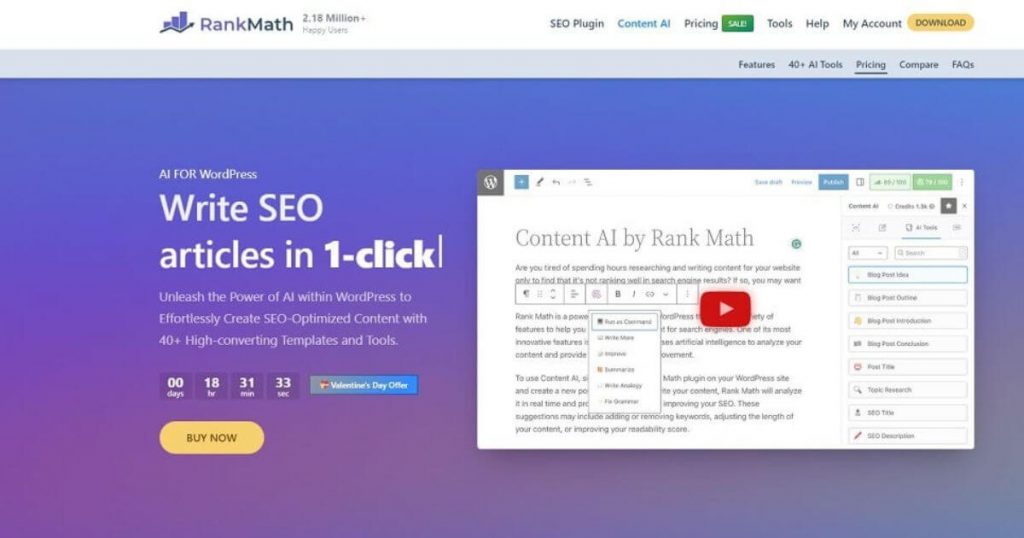
When it comes to upping your SEO game, RankMath Content AI is a real contender. Think of it as your personal SEO strategist that never sleeps, designed to fine-tune your content with precision, giving you the edge.
RankMath Content AI is the newcomer turning heads with its potent impact. This AI tool suggests keywords, questions, and links as you write, ensuring your content nails the SEO essentials.
RankMath offers reader-friendly recommendations. With its user-friendly dashboard and actionable tips, even non-SEO pros will find optimization less daunting. It’s about making content both search engine- and human-friendly, and RankMath nails that balance perfectly.
- Pros: AI-driven guidance, user-friendly recommendations, efficient content optimization.
- Cons: Suggestions may not always fit user preferences, potential extra charges beyond query limits.
#6 NeuronWriter
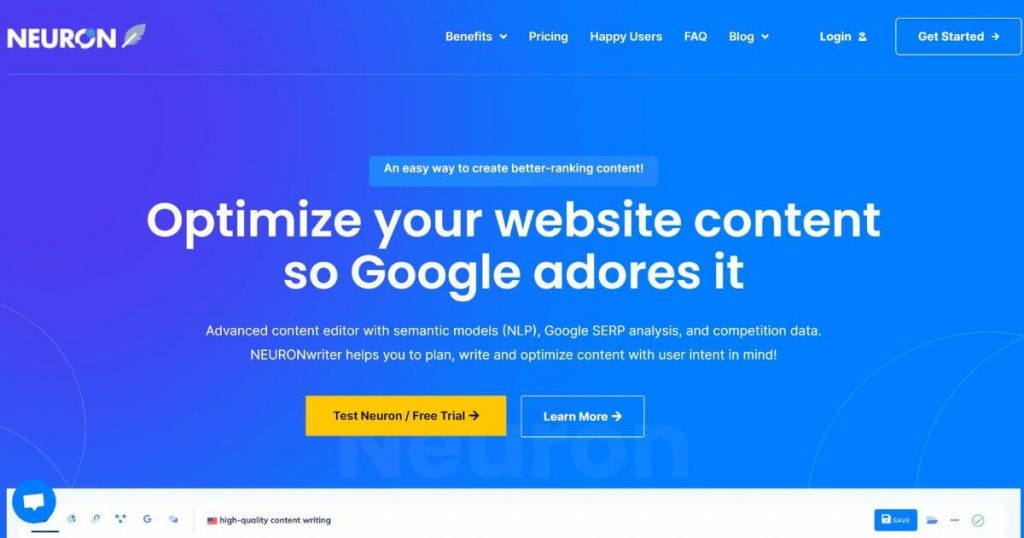
NeuronWriter stands out with its intuitive AI-driven content strategies, tailored to boost your SEO game.
Working with Neuron Writer has transformed my approach to SEO content creation. This tool provides live data for crafting detailed briefs based on real-time information. It classifies search intent, analyzes competitor structures, and offers workflows for robust content strategies.
Uncovering valuable questions from sources such as Google’s People Also Ask and Quora enhances my articles, while the text editor features seamlessly insert key sections from keyword reports. Neuron Writer’s assistance in organizing outlines and grading content quality as I progress significantly accelerates production.
“As an SEO expert who has used many SEO tools over the years, I have found success with Neuron Writer. It is a relatively inexpensive new SEO tool, but it offers a unique approach to content optimization. It uses AI to analyze top-performing content and identify patterns and trends to help improve the content’s performance.” — Tom Molnar, Operation and Content Manager, Fit Design
- Pros: High-quality AI output, integrated plagiarism checker, free trial, affordable lifetime deal, and comprehensive analysis.
- Cons: Limited AI article templates, challenging interface for some users, lack of warning for credit usage, and no media image recommendations.
Here’s my detailed comparison of Surfer SEO vs NeuronWriter.
#7 HubSpot SEO Marketing Software
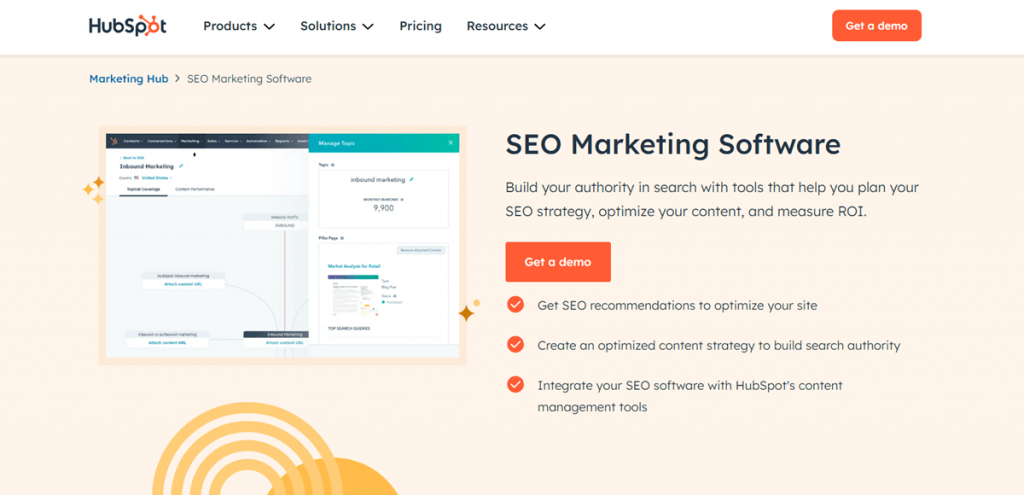
HubSpot SEO marketing software is a powerhouse for boosting organic search traffic. With its integration into HubSpot’s content management system (CMS), it simplifies the optimization process a lot.
This tool makes it easy to identify which pages require updates. These pages are arranged by priority, so you’ll know where to start. I love how every issue is explained in detail. This clarity empowers me to make informed decisions about my next steps.
What’s more, the HubSpot SEO tool gives some great topic suggestions and a ‘difficulty’ metric to gauge ranking feasibility. This metric considers relevance, popularity, and competition, providing a clear path to crafting a winning content strategy.
With this tool, you can also analyze Google Search Console data. This option enables you to track key topics and measure impressions and click-through rates. Custom reporting on marketing performance helps you assess your return on investment (ROI).
- Pros: Efficient top-page analysis and a user-friendly interface.
- Cons: No free trial is included.
#8 MarketMuse

If you’re searching for an SEO solution that truly does it all, prepare to be impressed by MarketMuse, a platform that elevates content strategy with its AI-powered insights.
MarketMuse uses AI to take your SEO game to the next level. This tool scans your content and gives it an SEO score. The MarketMuse platform digs deep into topics, finding keywords and questions that matter but that you might not have thought of.
This isn’t just any keyword research tool—it’s like having an expert whisper in your ear as you write. You’ll know what to cover for complete topic authority so search engines see you as the go-to source.
Plus, MarketMuse doesn’t stop there. It helps plan what to write about next.
- Pros: AI-driven insights, comprehensive SEO analysis, assistance in understanding changes, efficient planning for future content.
- Cons: Steep price, learning curve, overwhelming data, limited integrations.
#9 Page Optimizer Pro
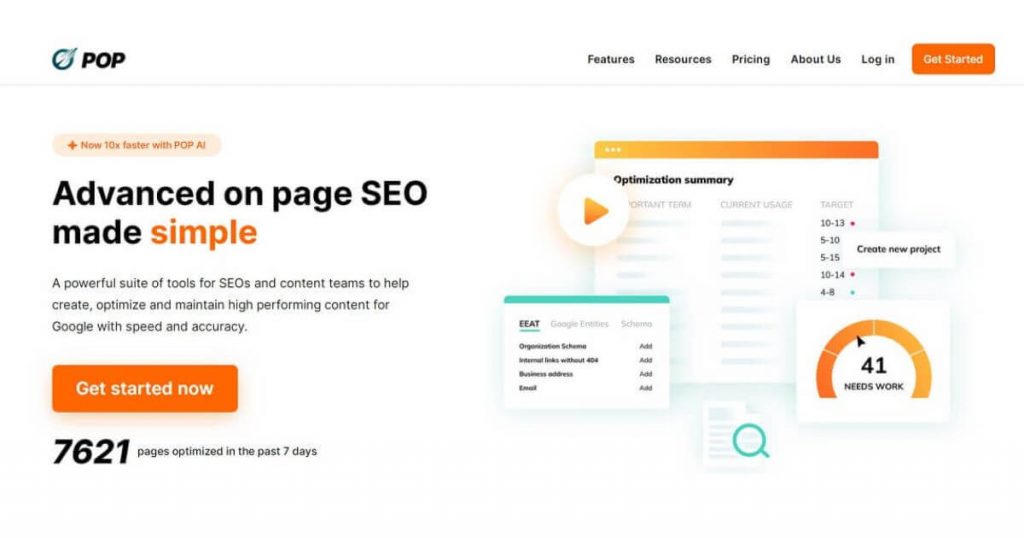
If you’re diving deep into the SEO world and looking for sharp, on-page optimization tools, Page Optimizer Pro might just be your ace in the hole.
Page Optimizer Pro helps improve on-page elements for better rankings. I get to use detailed analyses based on my top competitors’ pages. This tool breaks down what works for them, so I can apply it to my own content. It’s not just about keywords. Page Optimizer Pro dives deeper, assessing things such as headings, images, and word counts.
I love that you can generate reports telling you exactly how to optimize each page on your site. With this tool, I feel confident tweaking the small details that might slip by unnoticed but make all the difference in search engines’ eyes.
“We’ve been using Page Optimizer Pro for a couple of years now. When it comes to content optimization, it truly shines by preserving the authenticity of the content while guiding optimization. It acts like a co-pilot rather than taking the wheel entirely—suggesting changes but ensuring your message’s integrity stays intact.” — John Pennypacker, VP of Sales & Marketing, Deep Cognition
- Pros: On-page SEO optimization, detailed keyword analysis, expert guidance on optimization.
- Cons: A complex user interface, may be less intuitive for new users, and limited features compared to broader SEO tools.
#10 Clearscope
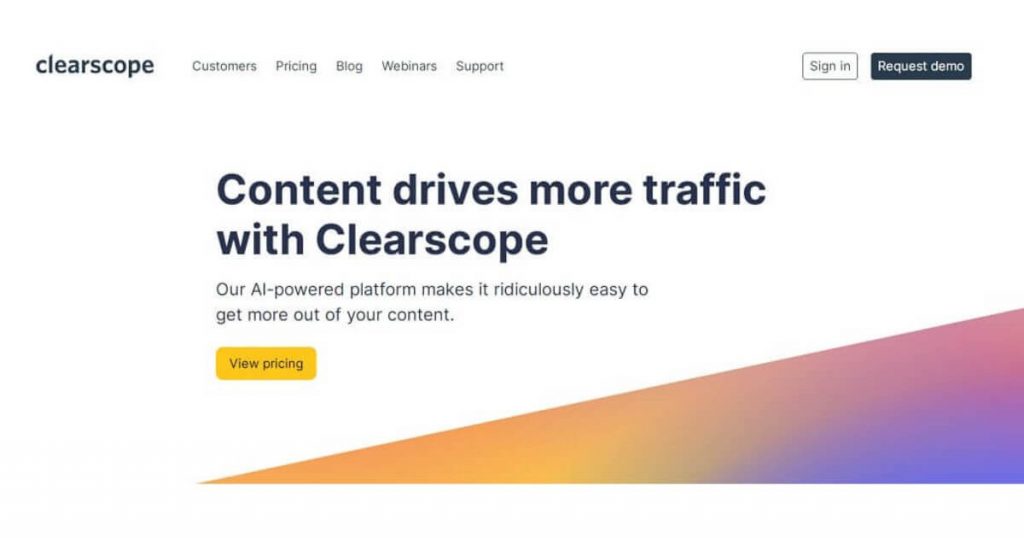
Clearscope makes sure I know what’s working on the top pages for my keyword. It’s like having a secret window into my competitors’ strategies. This tool doesn’t just stop there. It’s able to find important subtopics that boost the authority of my content. That way, I’m not guessing what to include—I have a targeted and relevant roadmap in any piece I write.
The best part? Clearscope clues me in on the ideal word count and even rates my drafts with a content score, so I can measure how close I am to hitting the SEO bullseye. It combines all these features on one platform.
- Pros: Efficient top page analysis, word count, and content score recommendations, budget-friendly.
- Cons: No free version, limited pricing details, potential financial commitment before trial.
#11 WriterZen
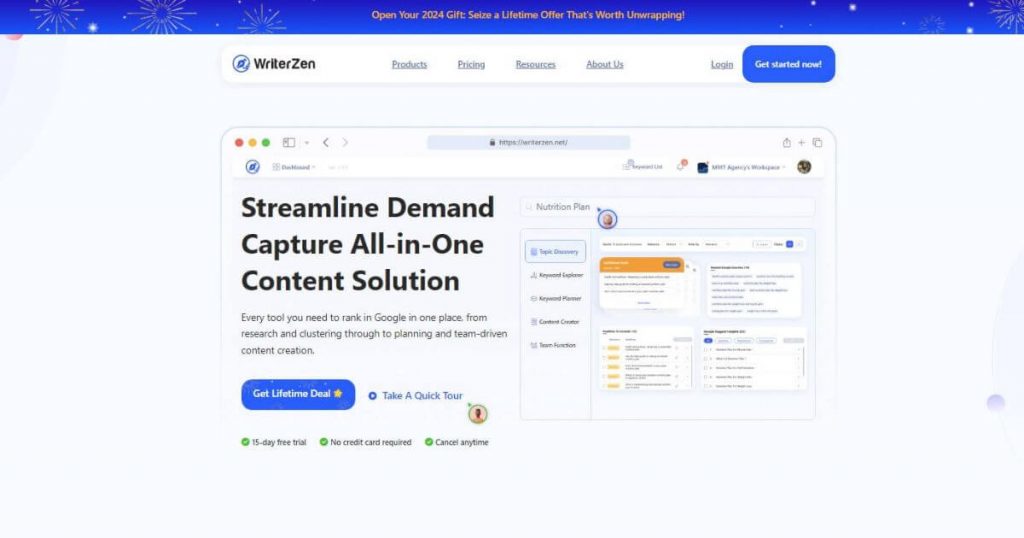
WriterZen hooks me in with its simple design and powerful tools. It’s an all-in-one SEO toolkit that feels just right—not too basic, not too complex. The platform comes loaded with features to help optimize content. I find tools such as the keyword explorer, topic discovery, and content creator especially useful for boosting my SEO game.
Using WriterZen makes creating SEO-friendly content a walk in the park. I get everything I need to research, write, and analyze my content—all within the same interface.
This means less time switching between apps and more time climbing up those search rankings.
- Pros: User-friendly interface, simplicity for newcomers, all-in-one spot for keyword research and content creation.
- Cons: Limited features for advanced users, less in-depth data reporting, may not cater to more extensive strategy adjustments.
If you are a blogger and need a straightforward tool for content optimization, you should definitely read my RankIQ review.
Conclusion
I’ve walked you through the ins and outs of some amazing Surfer SEO alternatives. Each has its own flair for boosting rankings and SEO success. Remember, the best tool is the one that fits snugly into your digital marketing strategy and makes your workflow smoother.
Whatever choice you make, it’s clear that these alternatives are ready to take your content to new heights. Keep an eye on those rankings, as they’re about to soar.
Want to dive into an in-depth Surfer SEO comparison? Check out my Surfer SEO vs Ahrefs article.
FAQ
What are Surfer SEO alternatives?
Surfer SEO alternatives are tools that offer similar or better features for optimizing content and improving website rankings, such as AI-powered content creation and detailed SEO analysis.
Why look for a Surfer SEO alternative?
You might want to find the best alternative to Surfer SEO to get more features, such as comprehensive SEO approaches, and backlink checkers, or just to explore options that could improve your SEO and content strategy even more.
Can an AI writer help with my SEO outlines like Surfer SEO does?
Absolutely. An AI writer designed for SEO outlines can assist in crafting content that’s optimized for search engines.
Are there any all-in-one SEO tools among these Surfer SEO alternatives?
Indeed. Some of the best surfer SEO alternatives available, such as Clearscope and WriterZen, boast a wide range of SEO features, offering everything from keyword research to competitive analysis—all in one place.
How do I choose another tool like Surfer SEO?
Think about what your site needs most: is it an AI-powered backlink checker? A broader suite of optimization tools? Or maybe a platform to help you create content? Consider your goals, then compare the top Surfer SEO alternatives based on their offerings—you’ll land on something tailor-made for your business to climb up those search engine ranks.



